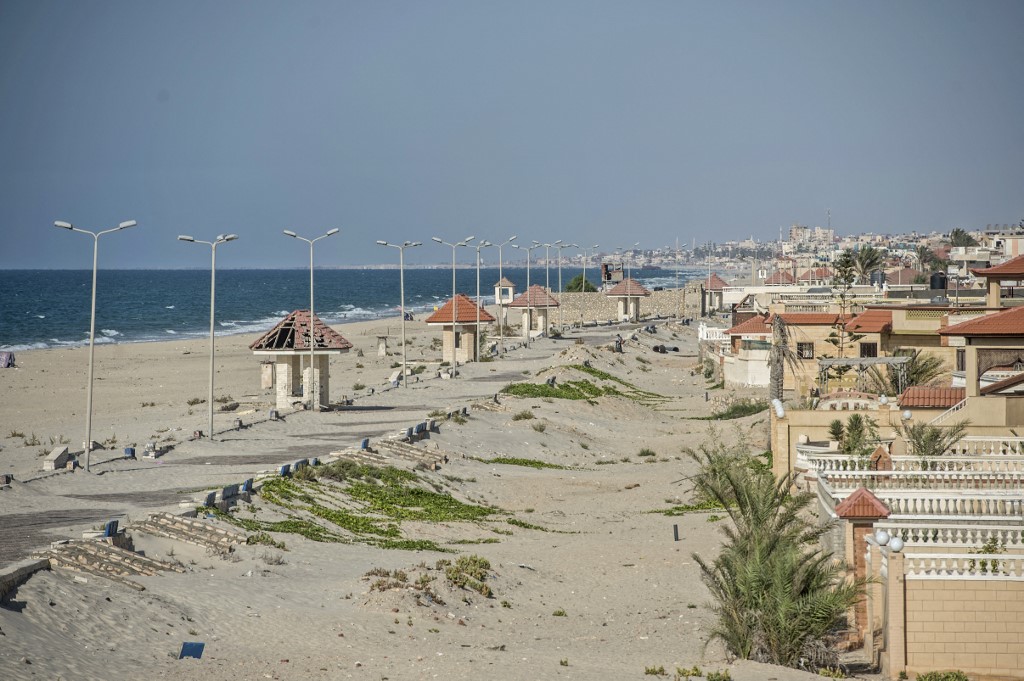Thousands in Egypt's North Sinai fight home demolitions as Suez Canal port expands

Thousands of people in Egypt's war-torn North Sinai are facing displacement by the military as plans move ahead to evacuate parts of Arish city to make way for a new Suez Canal port, sources and residents have told Middle East Eye.
No official number has been announced, but residents and activists have calculated that around 21,000 residents will be affected by the planned port at el-Arish, which sits on the Mediterranean coast to the east of the mouth of the canal and is the biggest city in the peninsula.
The MP for Arish, Rahmi Bakir, put the number at about 4,000.
The move is part of plans by President Abdel Fattah el-Sisi's government to privatise companies and other assets belonging to the Suez Canal Authority, allowing foreign investors or entities to control six strategic ports overlooking the Mediterranean and the Red Sea, including the port at Arish.
The privatisation is part of several acquisitions by foreign, mainly Gulf, countries in Egypt, which it is hoped will prop up the country's struggling economy.
Stay informed with MEE's newsletters
Sign up to get the latest alerts, insights and analysis, starting with Turkey Unpacked
But in a rare show of defiance in the heavily securitised peninsula, local residents have been protesting daily in front of the North Sinai governorate building, in the Rayisa area of the city, hoping for either a cancellation of the development or proper compensation for those who are evacuated.
"They have to kill us in order to kick us out," Khorshid, a baker whose house is under threat of demolition, told Middle East Eye. "Our houses are our honour."
Early in January, Prime Minister Mostafa Madbouly told the press that the development work taking place in the port of Arish, was part of "the strategy to develop Egyptian ports and raise their trading capacity... in pursuit of the sustainable development strategy of the Egyptian state".
Previously the land was publicly owned, but in 2019 a presidential decree included "re-allocating an area... of state-owned private land in the North Sinai governorate, for the benefit of the Armed Forces, to be used in the expansion and development of Arish Port".
The Armed Forces Engineering Authority is responsible for the development of the port and the surrounding area.
The developments entail the removal of residential areas surrounding the port and its administrative buildings, especially in the wider Rayisa district, which houses around 21,000 people, according to the North Sinai governorate.
The construction will include widening the platforms used to load and unload shipments and containers to and from ships.
Mohamed Abdel Fadil Shosha, from the office of the North Sinai governorate, told MEE that so far about 100 families have been compensated, but residents say that this number has been the same since 2020.
'I cannot convince my children who saw their house destroyed by the military to be patriotic or nationalistic'
- Salman, Arish resident
Depending on the size of the home, compensation ranges from from 100,000 to 350,000 Egyptian pounds ($3,275 to $11,455).
"The governorate is not a decision maker but only a channel between the people and the government. We have held meetings on 12 and 13 February in the headquarters of the governorate, and we are planning to deliver the resident's refusal to the political administration," Shosha's office said.
North Sinai residents have borne the brunt of the eight-year campaign in the region between Egypt's armed forces and Sinai Province, the local branch of the Islamic State group. Militants began staging attacks in 2011, while associated with al-Qaeda. Later, they pledged loyalty to IS, and began to be known as Sinai Province.
Death tolls in the conflict are not publicly available, but according to a count compiled by independent researchers, who maintain anonymity for their safety, more than 1,500 military personnel were killed between 2011 and June 2018.
Meanwhile, Human Rights Watch believes that over 100,000 of North Sinai's 450,000 residents have been displaced or left the region since 2013.
Arish city has been the site of several major attacks and kidnappings. A deadly security crackdown has left hundreds of civilians and military personnel killed.
The city has been under military lockdown since 2017, though the intensity of the attacks has decreased somewhat in the last two years, as it intensifies in Ismailia, the Suez Canal’s west bank.
Anti-government feeling
Salman, a 55-year old security guard at a petroleum company, used to own a flat in the Shalihat Al-Saad area, which was designated as "in the vicinity of development". In September 2022, he was informed by letter that he needed to evacuate.
Then, in the same month, he woke up and found the door of his house marked red, with the word "demolition" painted on it. In three days, his house was destroyed, with riot police there to prevent any kind of gathering or resistance.
"I can not convince my children who saw their house destroyed by the military to be patriotic or nationalistic," Salman told MEE, adding that his family has relocated to nearby Ismailia with other relatives.
Strong anti-government sentiment has been growing in the city, he said.
Several videos have circulated of residents staging minor gatherings to demonstrate their demands and calling on the government to stop demolishing their homes.
One of the protesters who attended the gatherings confirmed the authenticity of the videos and echoed the woes of the demonstrators. "We have endured the terrorists and their threats. We are now facing the terrorism of the governorate, which wants to demolish our house and kick us out," Om Mohamed, a 35-year-old woman, told MEE.
"Most of the houses in Rayisa are built by workers who worked for years to secure housing for their families. My brother and father worked as construction workers all over the peninsula in order to afford every brick, and now they want us to leave."
Om Mohamed and others fear that the suggested compensation won't be enough to buy land or houses in North Sinai, as have risen steeply since 2019, as the Egyptian pound has lost value and the military has claimed ownership over most empty spaces to build tourist and residential complexes.
Other locals are indigenous Sinai residents whose grandparents have lived in the city since the British occupation. "Our family participated in the resistance against the British and then against the Zionists in 1948. My father fought in different wars, including the 1973 crossing war, and we have remained and lived in Arish even though terrorists were roaming the streets," she said.
Protesting is rare in North Sinai, where the military and intelligence services have disappeared civilians.
Residents have been protesting online by publishing videos and posts pleading against the demolition of their houses.
One video published by the Sinai Foundation for Human Rights shows a man in a gathering of people in the port area. Speaking to the camera, he asked: "Why are they throwing us into the streets? They come in tanks to demolish our houses. Why? Are we not humans?
"Why is this taking place?" he continued. "For the interests of Qatar, the UAE, Israel, KSA [Saudi Arabia] or who? The country has been sold."
Attempts by civil society in 2021 and 2022 to find an alternative solution to fulfil the military's construction needs and save the houses have failed.
The head of the Engineers Syndicate in North Sinai, Amin Goda, said the syndicate drew up new plans that maintained "the goal of development and fulfilled the desire of local society" by expanding existing roads, instead of demolishing homes to build new ones. However, Goda told MEE that the proposal was refused by the military and the Engineering Authority.
Bakir, the MP for Arish, told MEE that while he acknowledges the economic importance of the project, he is demanding the development process be re-examined to prevent the deportation of residents. He has so far received no response from the government.
Bakir refused to comment on the gatherings of residents and called on the North Sinai elders and heads of tribes to intervene so as not to allow "inciteful elements to spread hatred between the military and the people".
A security source told MEE that the aim of the developments is security-oriented, as well as economic. Any foreign investor hoping to run the port, he said, would prefer not having a residential area close by, fearing infiltration by attackers or suicide bombers.
Middle East Eye delivers independent and unrivalled coverage and analysis of the Middle East, North Africa and beyond. To learn more about republishing this content and the associated fees, please fill out this form. More about MEE can be found here.







